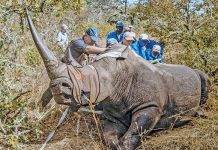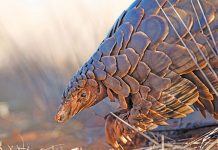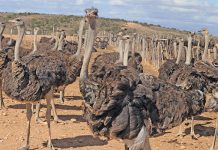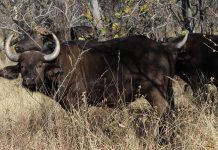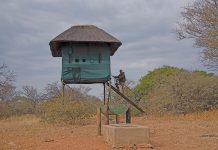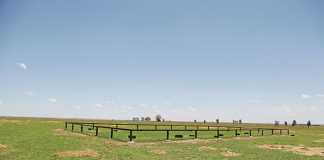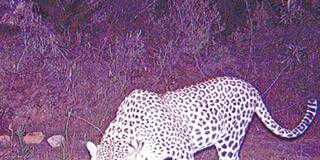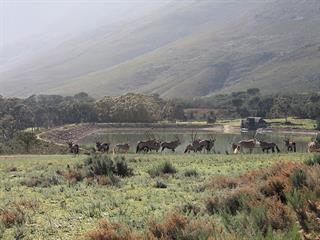
Four years ago, Arc-en-ciel, a 1 000ha horse stud farm between the Limietberg and the Groenberg in the Western Cape, was converted into a wildlife ranch. The operation, which focuses on the breeding of rare game, is run by businessman Fernando Rueda.
“Having always had a keen interest in game, my wife Suzanne and I made a decision to diversify from the original horse-breeding operation to game breeding. There have always been plains game roaming on the farm, and it therefore seemed a natural transformation,” he explains.
It is not uncommon for producers to diversify their operations to disperse risk and industry irregularities, and this is becoming increasingly popular in the current volatile economic environment. Game, rather than crops, is considered an excellent way in which to diversify while sustaining production and improving profitability.
“Generally speaking, the day-to-day expenses of game farming are proving to be significantly lower than traditional livestock farming,” Fernando says.
Schutz Marais, Arc-en-ciel’s farm manager, agrees. “There are a lot of farms in the province that are already suited for game faming. Farmers who are set up for livestock farming may need to do no more than [adapt] their fences.”
He adds that farmers who have areas that cannot be utilised for commercial stock or crop farming should consider adding game to their farms’ production portfolios.
Getting the right species
Fernando advises aspiring game farmers to begin conservatively with a species that they are particularly passionate about. Arc-en-ciel started with nine buffalo and seven golden wildebeest. Gradually, the operation expanded to increase the number and diversity of game on the farm.
Today, it has a variety of rare game species, including African buffalo, golden wildebeest, golden oryx, roan, sable, quagga, white, black and copper springbuck, as well as other, more common species such as kudu, giraffe, red hartebeest, grey rhebok, waterbuck, eland and black wildebeest.
“Although we believe in buying the best genetics we can afford, you don’t have to start with a R20 million buffalo bull,” Fernando says.
“It’s perfectly fine to start with a few females and a good bull. Appreciating that the backbone of the game industry is the hunting market, our intention is to breed genetically superior stud animals of higher value.”
Schutz cautions prospective game farmers who want to buy expensive rare animals to ensure, before purchase, that the animals are adapted to their local conditions, as this will greatly reduce the associated risks. He recommends that these farmers examine their environments and identify the species that already inhabit their farms.
“Ask yourself: will cattle do well here? If the answer is yes, then buffalo will also do well. If springbok do well on your farm, then colour variants of the springbok will also do well,” he says.
Feed and management
Currently, Arc-en-ciel has nine intensive-breeding camps ranging from 5ha to 50ha. While fencing can be a significant cost factor in game farming, it can be erected in stages.
Therefore, Schutz suggests that first-time game farmers decide which species they want to initially farm, before putting up fences.
“Many species don’t require a 2,4m- to 3m-high fence. For animals [like golden oryx], a 1,4 m fence will suffice.” Schutz advises farmers to build more camps than the number of herds they intend to buy. “Additional camps allow for rotation of animals if required,” he explains.
Fernando says that Arc-en-ciel’s animals are raised on natural pastures and fed a supplement only to ensure optimum growth and development.
“Game utilise what is in the veld better than a commercial animal, but supplements [pellets] sustain their condition. We just came through a drought where we also had to increase our feed more than we usually do. Despite the higher feeding cost, we are still not close to what a feedlot animal’s daily feed would cost,” he explains.
A bright future
Fernando believes that game farming will remain a viable business industry. “Game farming has its risks like any other livestock farming operation.
However, game animals don’t pose a bigger risk than farming with sheep or cattle – it all depends on how you approach the market.
“Hunting in South Africa is big business and we believe that the market is growing exponentially each year. South Africa is also one of the few countries in Africa where foreigners can come and hunt safely. The weaker rand, the security factor and the better infrastructure also help,” he says.
Colour variants
Fernando adds that breeding colour variants is a long process, and that there should not be an oversupply of these rare animals on the market. Furthermore, common plains game should outnumber the rarer game varieties.
Fernando and Schutz are also convinced that rare game prices will fluctuate with economic trends, like any other commodity.
“As there will not be a lot of them on the market, we believe the colour variant sector has a bright future ahead. To breed
the ultimate animal is a difficult and lengthy process, and therefore the genetically superior animals will always command premium prices, as is evidenced by the prices realised at leading game auctions,” Fernando says.
Contact Fernando Rueda on 082 652 1309 or [email protected]. Contact Schutz Marais on 072 3429553 or [email protected]. For more information, visit aecgame.co.za.

